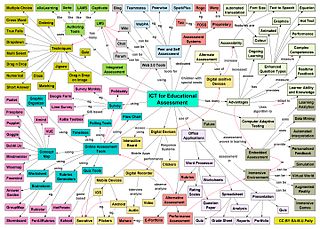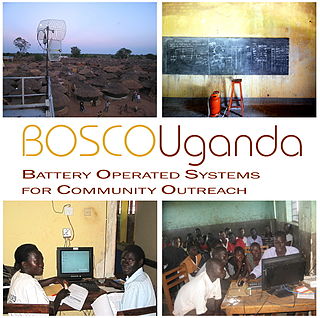Related Research Articles
Telecommunications in Tuvalu cover Tuvalu's 6 atolls and 3 reef islands. The islands of Tuvalu rely on satellite dishes for communication and internet access.
The global digital divide describes global disparities, primarily between developed and developing countries, in regards to access to computing and information resources such as the Internet and the opportunities derived from such access. As with a smaller unit of analysis, this gap describes an inequality that exists, referencing a global scale.

Information and communications technology (ICT) is an extensional term for information technology (IT) that stresses the role of unified communications and the integration of telecommunications and computers, as well as necessary enterprise software, middleware, storage and audiovisual, that enable users to access, store, transmit, understand and manipulate information.

The New Partnership for Africa's Development E-School Program is included as a means to provide ICT equipment such as computers and internet access to all schools in member nations within The New Partnership for Africa's Development (NEPAD) program. NEPAD parents the E-School Program and is an economic program that aims to bring economic and social development to African nations and ensure 'Africa's Renewal'. The E-School Program began with Demonstration Projects and has developed further yet remains a work in progress in many countries, facing both criticism and support.

A telecentre is a public place where people can access computers, the Internet, and other digital technologies that enable them to gather information, create, learn, and communicate with others while they develop essential digital skills. Telecentres exist in almost every country, although they sometimes go by a different names including public internet access center (PIAP), village knowledge center, infocenter, Telecottage, Electronic Village Hall, community technology center (CTC), community multimedia center (CMC), multipurpose community telecentre (MCT), Common/Citizen Service Centre (CSC) and school-based telecentre. While each telecentre is different, their common focus is on the use of digital technologies to support community, economic, educational, and social development—reducing isolation, bridging the digital divide, promoting health issues, creating economic opportunities, and reaching out to youth for example.
Education in Armenia is held in particular esteem in Armenian culture. Education developed the fastest out of the social services, while health and welfare services attempted to maintain the basic state-planned structure of the Soviet era, following Armenia's independence in 1991. Today, Armenia is trying to implement a new vision for its higher education system while pursuing the goals of the European Higher Education Area. The Ministry of Education and Science oversees education in the country.
The eTwinning action is an initiative of the European Commission that aims to encourage European schools to collaborate using Information and Communication Technologies (ICT) by providing the necessary infrastructure. Therefore, teachers registered in the eTwinning action are enabled to form partnerships and develop collaborative, pedagogical school projects in any subject area with the sole requirements to employ ICT to develop their project and collaborate with teachers from other European countries.

The University Computing Centre in Zagreb has a long tradition in the area of information and communication technologies. It was founded in 1971 within the University of Zagreb, the only Croatian university at the time, with the purpose to enhance the implementation of information technologies in the academic community as well as in Croatia in general.

Battery Operated Systems for Community Outreach (BOSCO) Uganda is a Not-for-Profit Organization (NPO) under the trusteeship of the Catholic Archdiocese of Gulu with registration number B9410051328-N registered on March 9, 2007. The organization which initially started as a collaboration between friends from Gulu,Uganda and the United States of America, who thought of using ICT to help end the isolation of communities in the IDP camps, by setting up ICT centres in the camps and connecting one ICT Centre with another.
Access to the Internet in Azerbaijan is growing, supported by a national strategy to develop the country into an information and communication technology (ICT) hub for the Caucasus region. The Azerbaijani government actively seeks to attract foreign aid to help boost the telecommunications and ICT sectors. While the government claims 85 percent of the population was online in 2013, service provider Baktelekom has provided free Wi-Fi zones in several points of Baku like the National Flag Square, the Boulevard, Old City, the park around the Heyder Aliyev Centre, parks of Sahil, Sabir, Samad Vurghun, Winter Park, as well as Port Baku Residence and Port Baku Mall.
Open Learning Exchange Nepal is a social benefit organization working to increase access to education through the integration of technology. Founded in 2007, the organization aims to increase the quality of education through the creation of open-source digital learning activities combined with teacher training.
The Academic Scientific Research Computer Network of Armenia (ASNET-AM) is the national research and education network (NREN) of Armenia. ASNET-AM was created in 1994. The structure and policy of ASNET-AM operation was developed and realized by the Institute for Informatics and Automation Problems of the National Academy of Sciences of Armenia.
Information and communication technology (ICT) in Kosovo has experienced a remarkable development since 1999. From being almost non-existent 10 years ago, Kosovar companies in the information technology (IT) domain offer today wide range of ICT services to their customers both local as well as to foreign companies. Kosovo has the youngest population in Europe, with advanced knowledge in ICT.
The TUMO Center for Creative Technologies is a free education program for teenagers aged 12-18 specializing in technology and design, with education being provided at various TUMO centers and hubs.

Ayb School, is a private educational complex in Yerevan, Armenia, opened in 2011 by the Ayb Educational Foundation. The school is named after the first letter of the Armenian alphabet Ayb.

Ucom is a mobile network operator and internet service provider based in Armenia. It is managed by Galaxy Group of Companies, a holding company operating in Armenia.
Ayb Educational Foundation was founded in 2006 in Armenia. The objective of the foundation is to "shape a culture of excellence in learning" and support the development of Armenian education.
Educational technology in sub-Saharan Africa refers to the promotion, development and use of information and communication technologies (ICT), m-learning, media, and other technological tools to improve aspects of education in sub-Saharan Africa. Since the 1960s, various information and communication technologies have aroused strong interest in sub-Saharan Africa as a way of increasing access to education, and enhancing its quality and fairness.

Kerala Infrastructure and Technology for Education (KITE) is a state owned special purpose company under education department of the Government of Kerala. It was developed to support ICT enabled education for schools in Kerala. The erstwhile IT@School Project was transformed into KITE for extending its scope of operations in August 2017. KITE was the first SPV company to get funded by KIIFB.
References
- ↑ "Armenia School Connectivity Program - ASCP".
- 1 2 3 "Site Recruitment Process & ICC Types - ASCP".
- 1 2 3 "Embassy News 2007 | Embassy of the United States Yerevan, Armenia". Archived from the original on 2014-11-29. Retrieved 2014-11-19.
- 1 2 "PH International | Armenia School Connectivity Programs". Archived from the original on 2014-11-29. Retrieved 2014-11-19.